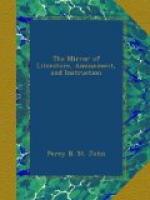of the seated players—in some measure produced
by ill health and intense anxiety so as to conceal
better feelings. I took my station at one end
of the table beside a middle-aged Frenchman, and by
way of forfeit-money (for mere lookers
on are not very acceptable company) threw a few five-franc
pieces, one by one, on the same colour with his stakes,
each of which varied from one to ten Napoleons.
After twelve chances I had lost about thirty francs,
but the Frenchman continued playing, and within twenty
minutes rose a winner of three hundred Napoleons,
which the banker changing for paper, he coolly put
into his waistcoat pocket, and walked off. A slight
emotion was visible around the table, but there was
no other expression. I had now time to look around
me, and enjoy a little reflection for my foolish risk.
It would be difficult to say whether more anxiety
was displayed among the sitters, or the company at
their backs. The attractive foci of all
eyes were the everlasting varieties of red and black,
though not accompanied by the usual grotesque mob
of kings, queens, and knaves, the latter being
probably excluded by the jealousy of their living
fraternity around the table. A strong and steady
light spread over the faces of all present, and in
some few showed the quiverings and workings of the
most intense passion; but the same stare or tip-toe
of hope and fear pervaded the whole assemblage.
Some counted their money with apparent caution, and
seemed to divide their winnings from their store with
affected precision, probably with an idea of the winnings
being unfit company for other coin; whilst others
listlessly played with their cash, or in a vulgar
phrase, handled it like dirt, the distinguishing feature
of the cold and calculating gamester, to whom money
is an object of secondary concern compared with that
of play. In the standing groupe I remember to
have noticed (from his personal resemblance to a friend)
a young Englishman, whom I afterwards learned had
been a constant visiter to that table during the previous
three months, and had then won about two hundred Napoleons.
He had just married an interesting woman, about his
own age, twenty-two, and had professedly taken up his
degree in the practice of play, as an elegant and
honourable mode of subsistence. A few weeks after
I met him and his wife, on the Italian Boulevards;
in dress he was woefully changed, and in his countenance
a ghastly stare, sunken eye, and emaciated cheeks,
bespoke some strong reverse of fortune: his wife
too seemed dimmed by sorrow, and suffering might be
traced in every lineament of her features, notwithstanding
the artifice of dress was tastefully displayed about
her person. Alas! thought I, how often is the
charm of wedded life snapped asunder by man—the
proud lord of the creation, and how often by his strong
hold on her affections, does he sink lovely woman
still fondly clinging to his disgrace, in the abyss
of crime and guilt.




